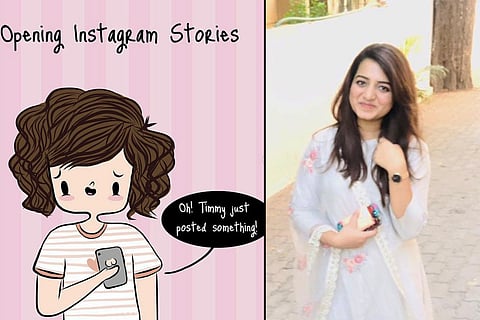

Those who are into sketches and doodles on Instagram, wouldn't have missed the antics of a 20-something woman. Fluff, as she is named, is as normal as the girl-next-door with issues that many of us face daily -- unexpected periods, anxiety around public toilets and endless disappointments around apparel fitting.
Akshara Ashok, a 21-year-old Chennaiite, is the face behind the Happy Fluff Comics that document the life of Fluff. The page, with around 618 posts and 2.14 lakh followers, is filled with appealing pictures that are often relatable to those who are called millennials and GenZ. The page was started around three years ago, when Akshara began posting her old sketches.
“I was not planning to make this a full-time thing and neither did I expect it to blow up. I just started by posting my old sketches and kept it a secret from even my best friends. I didn't think it would go anywhere and I didn't want any of my friends to make fun of me,” Akshara tells TNM. Thus began the online journey of Fluff. Adding that she named it ‘Happy Fluff comics’ on a whim, Akshara says that she's a big fan of Sarah Andersen’s comics and also follows several Indian doodlers and artists on Instagram.
Though her initial posts received a lukewarm response on social media, a comic about the trail room travails of Fluff became a runaway hit, which got Akshara hundreds of followers and instant fame.
“So that gave me an idea of what people like and I went with that theme. I started illustrating about girl issues and kept my style really simple. What I draw is what I go through or something that I see every day,” Akshara explains. After a year of drawing sketches, Akshara started accepting paid work for gifts and other personal projects.
A scroll through Happy Fluff Comics’ Instagram page gives a rough idea of the issues that are considered ‘those that must never be spoken about’ in mainstream society -- body image, mental health, menstruation etc.
“It was a conscious choice to speak and draw about these issues,” Akshara says. Adding that initially she did not think much about these things, Akshara points out that it is interesting that certain biological processes like menstruation and pooping are hardly talked about in society.
“I have always been very goofy. I never found any of it disgusting. Especially when I talk about periods, a lot of people don't like it, even girls. They tell me that it is very personal and that I should not be speaking about it in the open. I don't understand it. These are things that should be normalised,” she says. Similar was her experience with posts that dealt with aspects of mental health.
“People just don't like talking about these things. People think that we go for therapy because we are aliens or different. I've never understood why people react to these things the way they do when all these are natural to our existence,” she says.
When asked what keeps her going despite the negativity around the topics she amplifies, Akshara attributes it to her followers. “There are a lot of people who comment and send me messages, telling me that they felt good to know someone else can relate to what they are going through,” she says, noting that comments like these make her feel less alone in her journey.
Akshara’s drawings are also known for boldly presenting the female body as is, with breasts and body hair. Though initially she received hate messages for this, Akshara says that there is an audience which appreciates such goofy depictions of a normal human being. She adds that of late, she has been getting a lot of hate for speaking about queer issues through Fluff.
Akshara’s attempt to keep the page a secret from her near and dear ones did not really succeed. “People started finding out after it started popping up in the ‘Recommended accounts’ of Instagram. My friends recognised my work because I had shown a few of these pictures to them early on,” she says. The biggest surprise, perhaps, is that her parents have also come around to the idea of their daughter being vocal about issues that are considered a taboo traditionally.
“My parents didn't understand it in the beginning. They would always get creeped out when I showed them anything that I drew. I made this comic about public toilets and my dad was like -- are you okay, what is wrong with you? They were not sure of what I was doing, but now I think they get it,” she says.